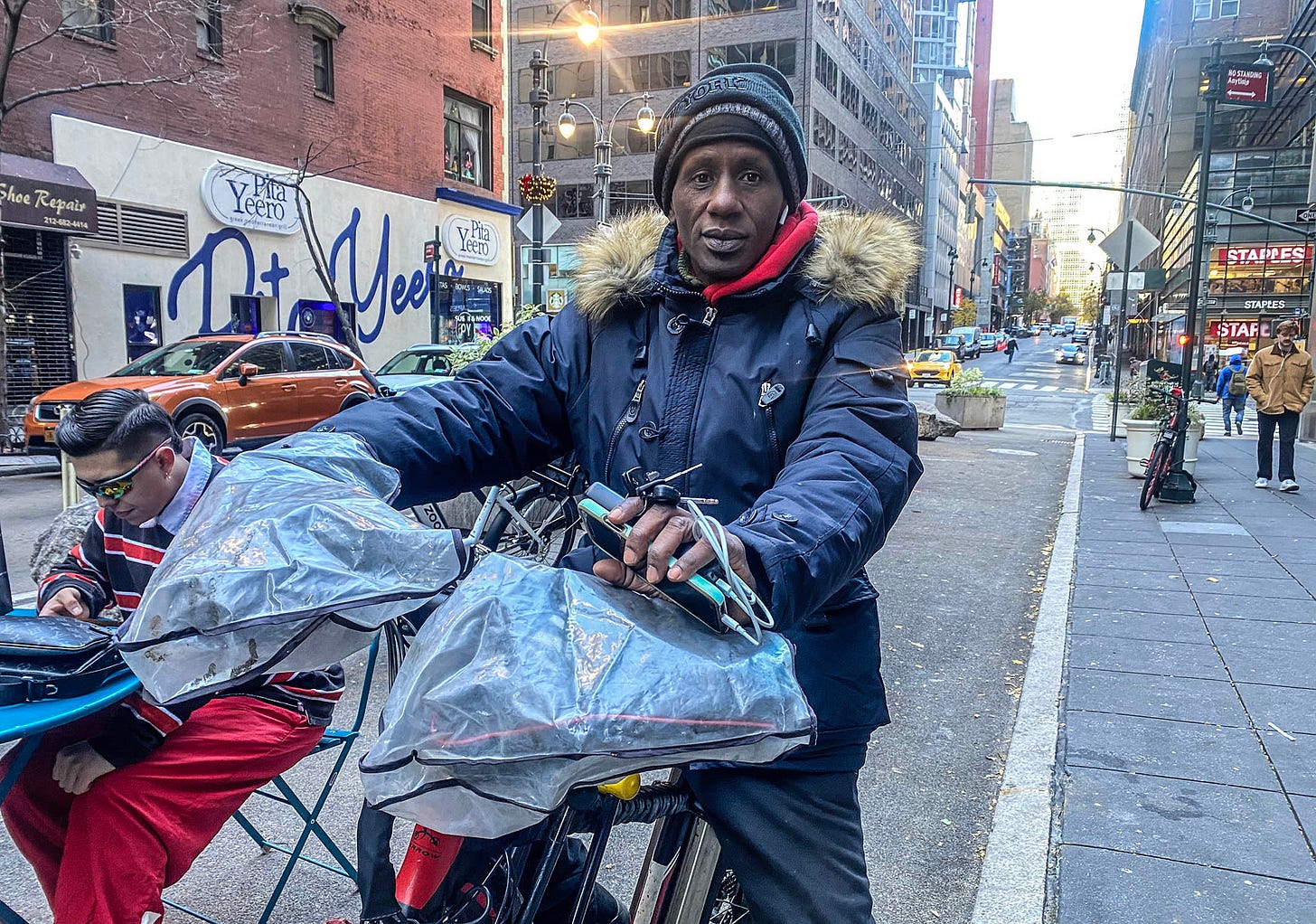Stealing the American dream – one bicycle at a time
Immigrant app-based delivery workers in New York City receive less than minimum wage, and are easy targets for criminals.
Maurice Oniang’o in New York

On a chilly Saturday morning, a man with a blue helmet raised over his forehead sits on a bench in the middle of Broadway, one of New York City’s major thoroughfares. Two unique tribal marks etched on his chin are a clue about where he was born 31 years ago, and where he was raised: Tenkodogo, Burkina Faso. He has been working as an app-based fooddelivery worker here in the Big Apple since June 2022.
Illiace Zabsonre is one of more than 65,000 delivery workers in New York, most of them immigrants, most from Latin America, some from Africa. With each order, they skilfully weave through the high-traffic labyrinth of America’s most populous city at a breathtaking pace. “Countdown begins the moment your phone pings,” says Zabsonre.
Each stop brings anxiety about a delivery worker’s nightmare: bicycle theft. Zabsonre first suffered the occupational hazard last October in Manhattan.
“I had two orders to deliver,” he says. “I parked the bicycle in front of the building and locked it in front of the doorman.”
He secured the bicycle by threading the lock through both the tire and mid-frame but did not fasten it to anything fixed. When he returned, it was gone. In the few minutes he was inside the building, the thief must have picked up the bicycle, lock and all, and carried it away.
“It was worth $1,800,” he says. “A huge setback for me.” Zabsonre supports a wife and child back in Burkina Faso. When he lost the bicycle, he had to pause sending back any funds until he made the money back. “I now must double my efforts.”
Regarded as independent contractors, delivery workers make less than the New York City minimum wage of $15 per hour – $14.18 per hour with tips, and $7.09 per hour without, according to a 2022 study. After expenses, they take home about $11.12 per hour with tips and $4.03 per hour without. Some make even less, according to the study.
“It was not always like this,” says Salifou Diallo, a restaurant delivery worker, originally from Conakry, Guinea. Diallo is in his mid-forties. In 2020 and 2021, he earned about $1,200 each week but his earnings have dropped significantly due to increased competition. “Today I make $600, sometimes less,” says Diallo, who works for 12 hours a day. This translates to approximately $7.14 per hour, less than half of the minimum wage. “You can barely survive on it.”
Diallo pays $850 per month for his room in a shared apartment in the Bronx and sends a quarter of his earnings back to Guinea to support his wife, two children, and his mother.
Things might get better. Last year, New York City passed a new minimum wage law mandating that app companies must pay city delivery workers a minimum of $17.96 per hour, in addition to tips.
Bicycle theft compounds the tight financial situation: Diallo has lost five electric bicycles in the past two years, causing him losses of roughly $10,000. He replaced three with his modest savings and turned to credit for two.
The most recent theft took place after a delivery in the Bronx. Sitting down to eat at midday, Diallo parked his bike and sat on a bench next to it. Two men approached him. “They sprayed something in my eyes and nose,” Diallo says. He fell unconscious and when he woke up, his bicycle was gone.
Neither Zabsonre and Diallo reported the thefts; they felt nothing would come of it. Other delivery workers stay silent as they lack the necessary documentation to work in the country, and fear that filing a police report would lead to deportation.
“To report, the bicycle has to be registered in your name,” says Serigne Sarr, a delivery worker from Senegal.
Sarr was at a busy intersection in Harlem, where many delivery workers from Senegal, Mali, Mauritania and Guinea congregate. Most of the workers at this intersection speak French or Arabic, and their mother tongues, which include Wolof, Mandinka, and Fula.
Sarr says bicycle thefts aren’t just a daytime concern – some of his colleagues have had their bicycles stolen in front of their apartments at night.
“You lock your bike securely and go to sleep. When you get back in the morning, the bike is not there.”



